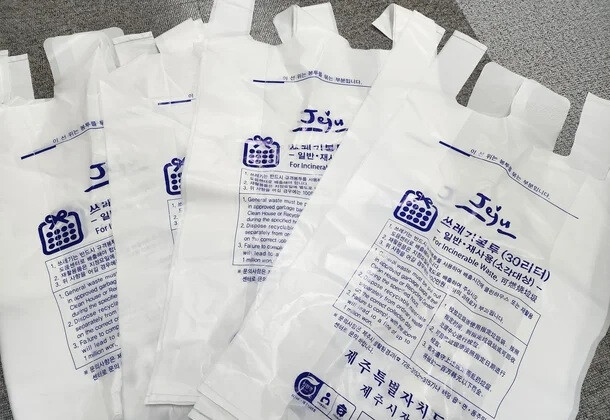
Jeju City's lax financial management system has come under scrutiny. Public outrage is growing following the discovery that a public service employee in Jeju City's Environmental Department embezzled over ₩600 million from waste disposal bag (jongnyangje bongtu) sales over several years. This incident unequivocally highlights comprehensive failures in the overall management of waste bag sales, inventory, and payment collection.
On July 29, Jeju City announced that it confirmed an employee, identified only as Mr./Ms. A (37), of the Environmental Department, embezzled ₩679 million from waste bag sales between 2021 and 2025 and has requested a police investigation. It is known that Mr./Ms. A had been in charge of related duties since 2018, raising concerns that the actual embezzled amount could be even higher. The Jeju Dongbu Police Station has currently booked Mr./Ms. A on charges of embezzlement and is investigating.
Crime Exploited Cash Payment Loophole, Embezzlement Continued for 5 Years
It has been revealed that this embezzlement scheme exploited a loophole in the cash payment system. According to the Jeju Special Self-Governing Province Waste Management Ordinance, waste bags are produced by Jeju Province, supplied through administrative districts, and payments can be made via various methods including cash, credit card, or invoice. Mr./Ms. A delivered waste bags to convenience stores and supermarkets, received cash payments, and then canceled the corresponding orders in the system, siphoning off the money. Transactions processed as canceled were not recorded as revenue, and the cash received went directly into Mr./Ms. A's pocket.
This criminal activity came to light on July 9, when a convenience store that had purchased waste bags with cash requested a receipt reissuance, revealing that the transaction had been canceled. Jeju City's investigation into cancellation records over the past three weeks found 43 cases, totaling ₩8.68 million, where bags were delivered normally but sales proceeds were not processed as revenue. A Jeju City official stated that the employee was immediately suspended from duty, and a police investigation was requested.
Systemic Management Failure, Repeated Public Fund Embezzlement
This incident is regarded as an example of a severe crack in Jeju City's financial management system. In particular, the failure to detect the embezzlement of over ₩600 million for five years has put the inadequacy of management and oversight under fire. Critics argue that lax management and auditing of cash-handling operations were the main culprits behind this large-scale embezzlement.
This is not the first time public officials have embezzled public funds. Public trust has been eroded by numerous past incidents of public fund embezzlement in public institutions. Calls for fundamental system improvements, beyond mere punishment of the involved employees, have been consistently made to prevent the recurrence of embezzlement. This incident reveals that despite previous warnings, Jeju City's financial management system remains vulnerable.
Urgent Need for Recurrence Prevention Measures, Strong Accountability Promised
Jeju City Mayor Kim Wan-geun held a press conference on July 29, apologizing to citizens for the incident and promising to implement measures to prevent recurrence. Mayor Kim stated that severe disciplinary action would be taken against the employee and their supervisors once the investigation is complete. He also emphasized that the city would make every effort to prevent recurrence by regularizing comprehensive audits of cash-handling operations, introducing a mandatory rotation system for cash handlers, and implementing a pre-payment system that fundamentally prevents cash receipts.
Jeju Province also announced a complete overhaul of its waste bag management system following this incident. Specifically, cash payments for waste bags will be completely abolished, and only credit card and account transfers will be permitted. The existing phone order system will be converted to an online order and payment system. Daily records of waste bag inventory inflow and outflow will be maintained, and regular monthly stock checks will be conducted. Furthermore, waste bag delivery duties will be implemented on a two-year rotating basis to prevent any single employee from monopolizing the task for an extended period.
This incident raises serious concerns about Jeju Province's administrative transparency and fiscal soundness. Jeju City must use this incident as an opportunity to thoroughly investigate the truth and implement strong system improvements to regain public trust. To prevent recurrence and achieve transparent administration, it is crucial to address the structural issues rather than simply attributing them to individual misconduct.
[Copyright (c) Global Economic Times. All Rights Reserved.]




























